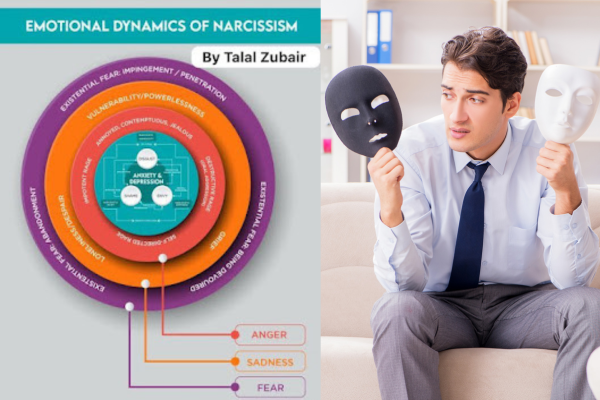
Understanding Emotional Regulation in Narcissistic Individuals
Emotional regulation is the ability to manage and respond to emotional experiences in a balanced and constructive way. For narcissistic individuals, however, this regulation is often impaired or entirely absent. Their emotional responses are typically extreme — ranging from explosive outbursts to complete emotional shutdown.
Emotional Dysregulation in Narcissism
People with narcissistic traits tend to either shout, blame, or abruptly withdraw when triggered. Their inability to handle emotional discomfort stems from deep-rooted patterns developed during childhood. Many narcissists grew up with emotionally immature or narcissistic parents themselves. As children, they were exposed to chaotic emotional environments, leading to two common outcomes:
Under-Regulation – Reacting impulsively with anger or rage.
Over-Regulation – Suppressing emotions entirely to avoid vulnerability.
Both extremes are unhealthy and form coping mechanisms that follow them into adulthood.
What Is Healthy Emotional Regulation?
Healthy emotional regulation means recognizing, owning, and expressing emotions in a mature and appropriate way. It involves:
Naming the Emotion: Saying “I’m feeling anxious” or “I’m sad” instead of acting it out.
Expressing it Properly: Talking, writing, or creatively releasing emotion — like crying during grief or laughing at something genuinely funny.
Processing Emotion: Giving yourself space to feel rather than suppressing or reacting impulsively.
Respecting Boundaries: Not expecting others to feel the same way or fix your feelings for you.
Example:
Imagine you’re frustrated after a disagreement. Instead of yelling or slamming the door, you say, “I need a few minutes to cool off,” and take a short walk. You come back, express your concerns calmly, and listen to the other person’s point of view.
This is emotional regulation in action: you’re not ignoring your feelings, but you’re also not allowing them to control you.
Common Techniques for Healthy Regulation
Deep breathing, journaling, and mindfulness practices
Using “I” statements to express emotion without blaming
Seeking therapy or professional support when emotions become overwhelming
Viewing both sides of a conflict rather than staying stuck in personal narratives
A key aspect of healthy emotional regulation is empathy — acknowledging that others have their own emotional experiences too. You are not the only one going through something; relationships require emotional flexibility and perspective-taking.
Consequences of Poor Emotional Regulation
When emotions are either avoided or expressed destructively, they often lead to:
Personality Disorders (including Narcissistic Personality Disorder)
Substance Use Disorders
Mood Disorders
Impulse Control Problems
Complex Trauma Responses
In narcissistic individuals, emotional regulation is often substituted by manipulation, projection, and defensiveness. They struggle to feel emotions honestly or allow others to feel theirs. As a result, relationships suffer, and personal growth remains stunted.
In Summary
Emotional regulation is not about suppressing emotions — it’s about owning them, expressing them appropriately, and responding empathetically to others. For those struggling with narcissistic traits, developing healthy regulation skills is not only possible but essential for building meaningful connections and inner peace.
If you grew up with narcissistic parenting or find yourself trapped in unhealthy emotional patterns, professional help can guide you toward healing. The journey to emotional balance begins with awareness and willingness to change.
